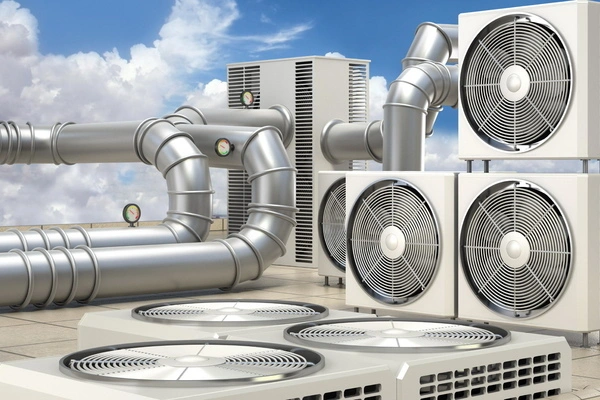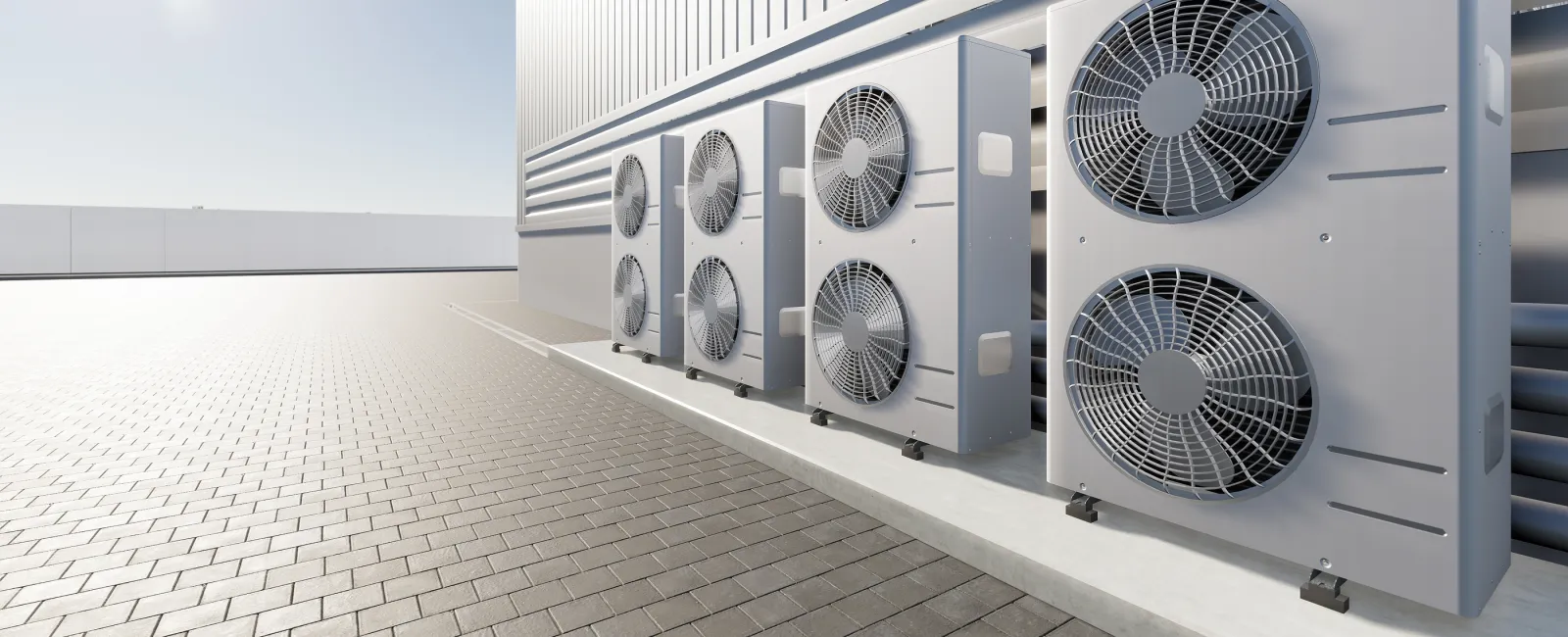Discover how HVAC experts offer subscription services for systems
Wiki Article
Discovering the Essential Elements of a Reliable Cooling And Heating System
An efficient heating and cooling system is developed on a number of vital components that operate in harmony. Each component, from the thermostat to the ductwork, plays an essential duty in keeping comfort and power performance. Comprehending these elements is essential for optimizing performance and enhancing indoor air high quality. As one analyzes these parts, the intricate partnerships in between them expose understandings into boosting total system performance. What details aspects contribute most to this performance?The Role of the Thermostat in HVAC Performance

Although frequently ignored, the thermostat plays a vital function in the performance of cooling and heating systems. HVAC experts. This tiny device functions as the primary nerve center, regulating temperature level setups and making sure optimal comfort within a room. By accurately noticing the ambient temperature level, the thermostat interacts with the air flow, air, and home heating conditioning devices to maintain the desired climate
A reliable thermostat decreases power intake by activating the HVAC system just when essential, thereby avoiding excessive home heating or air conditioning. Modern programmable and smart thermostats boost this efficiency further by enabling users to set schedules and from another location change setups, adjusting to everyday routines.
The placement of the thermostat is important; improper area can lead to unreliable temperature readings, resulting in inefficient procedure. In general, a well-functioning thermostat not just enhances comfort but likewise adds significantly to energy cost savings and the durability of the heating and cooling system.
Understanding the Significance of Air Filters
Air filters serve a crucial feature in a/c systems by assuring that the air circulating within a space continues to be tidy and healthy. These filters trap dirt, irritants, and various other contaminants, stopping them from being recirculated throughout the atmosphere. By catching these bits, air filters add to improved interior air quality, which can significantly benefit occupants' health and wellness, particularly those with allergic reactions or respiratory system conditions.Additionally, preserving clean air filters improves the effectiveness of a/c systems. Clogged up filters can limit air movement, creating the system to function tougher to preserve preferred temperature levels, resulting in boosted energy consumption and higher utility bills. Regularly replacing or cleaning up filters is an essential maintenance action that can prolong the life expectancy of heating and cooling equipment. Inevitably, recognizing the importance of air filters enables homeowners and building supervisors to take positive steps to ensure a well-functioning, reliable cooling and heating system that promotes a comfortable and secure interior setting.

The Functionality of the Furnace and Heatpump
Heaters and heat pumps are important components of heating and cooling systems, in charge of offering warmth throughout cooler months. Furnaces operate by heating air through burning or electrical resistance, after that dispersing it throughout the home by means of ducts. They commonly use rapid home heating and can be fueled by natural gas, electricity, or oil, depending on the system type.On the other hand, heat pumps move warmth instead than produce it. They remove warmth from the outdoors air or ground, even in low temperatures, and transfer it indoors. HVAC experts. This twin functionality enables heat pumps to additionally give air conditioning in warmer months, making them flexible options for year-round environment control
Both systems need appropriate upkeep to assure efficiency and long life. While furnaces succeed in extreme chilly, heatpump can be useful in modest climates. Understanding their distinct functionalities help homeowners in selecting one of the most suitable choice for their home heating requires.
Checking Out the A/c Device
The air conditioning device is a crucial part of HVAC systems, readily available in different kinds to suit various requirements. Comprehending the efficiency rankings of these systems is crucial for making notified choices about energy consumption and expense. This area will Get the facts certainly explore the varied types of air conditioners and make clear how effectiveness scores impact performance.Kinds Of Air Conditioners
While numerous factors affect the option of cooling systems, comprehending the different types offered is crucial for property owners and structure supervisors alike. Central air conditioning conditioners are made to cool whole homes or structures, utilizing a network of ducts for airflow. Window systems use an even more localized solution, suitable for little spaces or single areas. Portable ac unit offer adaptability, allowing individuals to relocate the unit as required. Ductless mini-split systems are an additional choice, combining the performance of main systems with the comfort of zoning, as they require no ductwork. Geothermal systems harness the earth's temperature for energy-efficient cooling. Each type features unique benefits, making educated selections crucial for efficient climate control.
Effectiveness Scores Clarified
Understanding effectiveness ratings is vital for picking the appropriate a/c unit, as these metrics supply insight into the system's efficiency and energy consumption. One of the most common ranking for a/c unit is the Seasonal Power Efficiency Ratio (SEER), which gauges the cooling outcome during a regular air conditioning season separated by the total electric power input. A greater SEER indicates much better efficiency. Furthermore, the Power Performance Ratio (EER) is used for determining efficiency under get more certain conditions. An additional essential metric is the Power Star qualification, which symbolizes that an unit meets rigorous energy efficiency standards. By examining these scores, customers can make informed options that not only enhance convenience yet additionally minimize power costs and environmental impact.The Significance of Ductwork and Air flow
Efficient ductwork design and air flow monitoring play crucial duties in the total efficiency and efficiency of HVAC systems. Correct ductwork guarantees that conditioned air is dispersed evenly throughout an area, lessening temperature level fluctuations and enhancing convenience. Well-designed air ducts reduce resistance to airflow, reducing the work on a/c devices and inevitably reducing power usage.Airflow management involves tactically placing vents and signs up to boost the flow of air. This protects against usual problems such as hot or chilly areas, which can occur when air flow is obstructed or inadequately balanced. Additionally, the right air duct materials and insulation can even more improve efficiency by reducing warm loss or gain during air transit.
An effective ductwork system not just adds to energy financial savings but can also extend the life-span of a/c devices by minimizing unnecessary strain (HVAC experts). Understanding the value of ductwork and airflow is crucial for attaining peak HVAC system performance.
Routine Upkeep Practices to Boost Efficiency
Normal maintenance practices are essential for ensuring peak performance of a/c systems. These methods consist of regular inspections, cleaning, and required fixings to keep the system running successfully. Regularly altering air filters is important, as blocked filters can block airflow and lower efficiency. Additionally, professionals must inspect and tidy evaporator and condenser coils to avoid overheating and power waste.Yearly expert evaluations are also advised, as experienced technicians can identify possible problems prior to they escalate. Lubricating relocating components reduces wear and tear, adding to a longer lifespan for the system. Furthermore, guaranteeing that the thermostat operates correctly aids in maintaining suitable temperature control.

Often Asked Questions
How Usually Should I Change My Thermostat?
Thermostats need to normally be changed every 5 to 10 years, depending upon usage and technology advancements. look at these guys Routine checks are advisable to assure peak efficiency, particularly if experiencing inconsistent temperature level control or boosted power expenses.What Dimension Air Filter Is Ideal for My Cooling And Heating System?
The ideal dimension air filter for a heating and cooling system varies by system layout. Usually, it's essential to consult the proprietor's manual or examine the existing filter measurements to ensure peak performance and air top quality.Can I Mount a Warmth Pump Myself?
Installing a warm pump individually is feasible for proficient people, however it needs knowledge of electrical systems and local codes. Working with a specialist is suggested to guarantee correct installment and perfect system efficiency.Just how Do I Know if My Ductwork Is Reliable?
To figure out ductwork effectiveness, one should look for leakages, step air flow at vents, check insulation high quality, and assess temperature distinctions between supply and return air ducts. Specialist assessments can supply extensive insights into general performance.What Are Indications My HVAC Requirements Immediate Upkeep?
Signs that a cooling and heating system requires instant upkeep include uncommon noises, inconsistent temperatures, increased power expenses, undesirable odors, and regular biking. Dealing with these problems without delay can protect against more damages and warranty height system efficiency.Air filters offer a necessary function in Cooling and heating systems by ensuring that the air circulating within a space remains tidy and healthy and balanced. Additionally, preserving clean air filters enhances the efficiency of Cooling and heating systems. Ductless mini-split systems are another alternative, integrating the effectiveness of central systems with the ease of zoning, as they require no ductwork. Understanding efficiency rankings is important for picking the ideal air conditioning system, as these metrics offer understanding into the system's performance and energy usage. The ideal size air filter for an A/c system varies by unit design.
Report this wiki page